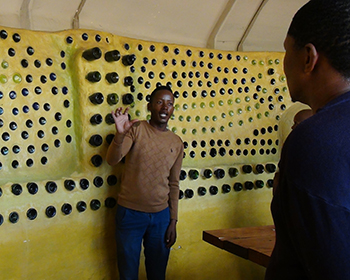Latest News Archive
Please select Category, Year, and then Month to display items
04 April 2024
|
Story Lunga Luthuli
|
Photo SUPPLIED
 Dr Juliet Kamwendo champions gender-inclusive climate action in Africa. Her expertise at the recently held AFR100 workshop highlighted vital steps towards sustainable and equitable development.
Dr Juliet Kamwendo champions gender-inclusive climate action in Africa. Her expertise at the recently held AFR100 workshop highlighted vital steps towards sustainable and equitable development.
Dr Juliet Kamwendo, Lecturer and Programme Director for Gender Studies in the Centre for Gender and Africa Studies at the University of the Free State, is spearheading efforts to integrate gender considerations into Africa's climate restoration agenda. Reflecting on her involvement, Dr Kamwendo stated, "This is particularly crucial, as women make up almost 50% of the population in Africa, and the depletion and degradation of land affect them disproportionately."
She recently served as a gender expert at the AUDA-NEPAD AFR100 workshop in Ouagadougou, Burkina Faso, from 25 to 29 March 2024. This initiative aims to restore forests and degraded land across Africa by 2030, with a focus on gender equality.
The workshop emphasised the integration of gender perspectives into the AFR100 project, acknowledging the disproportionate impact of land degradation on women. Dr Kamwendo's expertise highlighted the need to empower women in climate change interventions, addressing existing gender inequalities exacerbated by environmental degradation.
“Women – who are primarily responsible for household food security and water provision – bear the brunt of environmental degradation, leading to increased workloads, reduced income opportunities, and heightened vulnerability to climate-related disasters. Furthermore, the loss of forest cover and biodiversity further exacerbates the challenges faced by women, particularly in rural areas where they depend heavily on natural resources for their livelihoods,” added Dr Kamwendo.
Her participation highlights academia's crucial role in fostering inclusive and sustainable development, emphasising interdisciplinary collaboration to tackle complex environmental challenges. Through initiatives such as AFR100, stakeholders are working towards a more resilient and gender-responsive future for Africa.
Eco-building workshop and rehabilitation through collaboration
2017-03-17

A demonstration of eco-building at Lebone Village
recreation centre
Photo: Supplied
An intimate learning platform was created when Velile Phantsi and Mokoena Maphalane, two community members who had received training in eco-building from the University of the Free State (UFS) Centre for Development Support (CDS) under the Faculty of Economic and Management Sciences, presented a workshop for 10 Free State psychiatric patients in Bloemfontein on 23 February 2017.
Building self-sustaining communities
The training programme took place at Lebone Village recreation centre, at a structure that was built through the eco-building initiative, Qala Phelang Tala (Start Living Green). The collaboration between the Department of Occupational Therapy at the Faculty of Health Sciences and CDS has the potential to address unemployment and housing backlogs and forms a significant part of the rehabilitation of vulnerable people. It has also created prospects for community-based research.
Training and support to rehabilitate vulnerable people
Following the sharing of skills, the Department of Occupational Therapy will continue to work with patients through this community engagement project. Trainees will receive support in building a recreation centre structure at their own complex. During the presentation Mokoena Maphalane shared his personal experience of how physical activity such as eco-building helped him recover from the debilitating effects of a stroke. It is something he hopes will assist other patients in the future.
More information on eco-building.